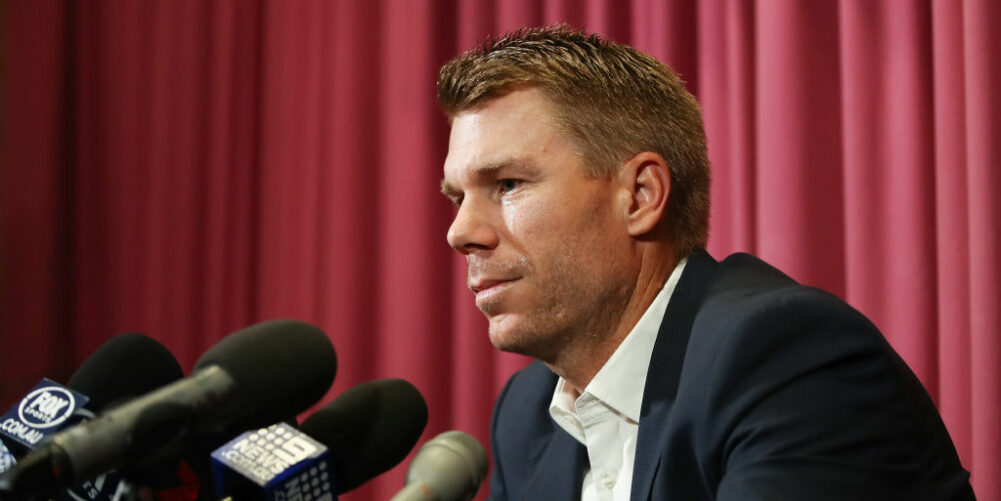(Photo: Getty Images)
As Cameron Bancroft hastily shoved something yellow down his trousers in full view of a dozen television cameras, the hashtag #sandpapergate started trending. Little did the internet know at that moment in time how apt the label was to become.
Following a public denial, only days later was it in fact confirmed, Cluedo-esque, that it had been Mr Bancroft, on the cricket pitch, with a piece of sandpaper. The act, of ball-tampering, was illegal but it was the cover-up, the lie in the immediate aftermath, which turned Smith, Bancroft and subsequently Warner into condemned men.
That they should lie over something so trivial, so prevalent, seems incredulous in the scheme of things. Yet both Bancroft and Smith, flustered and under pressure having been caught red-handed, panicked. Ball-tampering, as admitted by many, is widespread, condoned even by the authorities at times. The ensuing fabrications, poorly executed and quickly proven, less so.
President Nixon may be forgiven for thinking no one might have found out his misdemeanor. The wonder now, with such advances in technology and surveillance, is that anyone still believes that the truth won’t come out in the end.
Yet cover-ups continue. Politics offer many examples. Remember Chris Huhne, once the Energy and Climate Change Secretary? He got a few speeding points on his driving licence; we’re all prone to it on occasion. The jail sentence was for lying about it. Damian Green is a more recent casualty. Pornography had been found on his computer in 2008, not an illegal act at the time. Only Green denied it was his, which turned out to be a lie. He resigned.
Often, the initial lie comes from a moment of panic. Bancroft said he panicked on the pitch. His press-conference was a panic of far greater scale. Fight-or-flight, that Darwinian involuntary response, reflects not how you want to act at the time, but how your surroundings, experiences and culture in which you are present, make you react. It reflects your conditioning.
That Smith and Bancroft’s first response was to lie belies a culture which needs changing and will be the difficult and overriding task of the incoming coach Justin Langer. His appointment, as a respected coach intent on developing his players as people, should be welcomed, but declaring all problems solved, as some perhaps more partisan outlets have done, is premature.
One welcome aspect of Langer’s appointment is his willingness to forgive. Cricket Australia’s CEO, James Sutherland, has taken a similar stance. Some might argue that it is too soon. Others that this is for performance and legal reasons alone; to pave the way for the rapid return of Australia’s premier batters while avoiding any accusations of restraint of trade.
There may be elements of this, but to attribute it to only these reasons is to do Langer’s track record, as a coach at least, a disservice. All that have served under him, in Western Australia especially where he has transformed a team of unruly also-rans into disciplined performers, pay homage to his “harsh-but-fair” methods. How he approaches David Warner especially will be interesting to see. So far, the feeling is that Warner is a challenge for Langer, and one which, underneath it all, he’s likely relishing.
What motivated Warner, and his co-conspirators, is key. There was no violence, nor was it greed that led to ball tampering. Indirectly they may have been enriched, should Australia have won, but more likely the motivation stemmed from a moment of anger, vengeance perhaps for perceived ill-treatment, but a burning desire to win, whatever it took.
In this there is a fundamental different to match-fixing, in which the perpetrator has already sacrificed that primal desire to win. For those that have seen Langer’s playing career, and from his sentiments already expressed, this is paramount: the will to win, not for you, but for your team, and in Langer’s mind, the country.

There are flaws in this approach, notably that a win-at-all costs mentality can surpass the qualities of fair play and honesty. Like many of the world’s best, Warner’s game is fuelled by a natural aggression. This is similar to Ben Stokes, or Kagiso Rabada, or Marlon Samuels, all of whom have found themselves on the wrong side of authority in some form or another. Australia’s, and many other countries’, team culture appears to equate this aggression to a desire to win at all costs. They are wrong; there is a place for passion within participation, however much Baron Pierre de Coubertin’s lofty Olympic ideal may be ridiculed.
Why did Warner, lauded for his vice-captaincy, his T20 leadership, his role in player payment negotiations, talking only the week before about making a wider difference, in politics perhaps, do what he did? And why was it not seen coming?
Warner does not have many supporters, something everyone seems to agree on. Allegedly there are even players within the Australia team now unwilling to play with him once available. Smith and Bancroft have been hailed as “good blokes” who made “grave mistakes”. Not Warner.
One can’t help but feel however that he has been let down by the system, the culture, the set-up. It is one which Lehmann appears to have been integral to, hence perhaps his decision to resign, despite having had no direct links to the incident itself. Warner might not be a particularly great bloke, but there are a lot of ‘not pretty great blokes’ in professional sport, even if your mates vocally, and subjectively, adjudge otherwise.
Warner had a position of power and he exploited it. That is clear. But it was also a period of high stress, in an environment which he thought would not condone it. The crowd abuse, poor performance, who knows what else – like a pressure cooker that just went pop. Not for money, nor greed, just anger.
This is where the wider set-up is culpable. There have been signs in the recent past that Warner has realised he has had to change some of his more natural instincts: going teetotal, practising meditation, mindfulness, an awareness of his family, his short-form captaincy, his leadership. The conviction, and calmness, which he presented in many an interview. His nickname even, ‘The Reverend’.
Perhaps it was all a facade. Maybe the internet, the arbiter of all things, is right: he is a bad bloke above all bad blokes. But there appears to be wider issues at play, and Warner, while also the perpetrator, is a victim too. He has been failed by a system which encouraged his tribal instincts where it brought success, while ignoring the negative effects, slowly building in the background.
One can only hope that with the introduction of Langer, and his ideals of redemption, there are appropriate support structures in place to help Warner, and his family. Because so far, they have been lacking.















